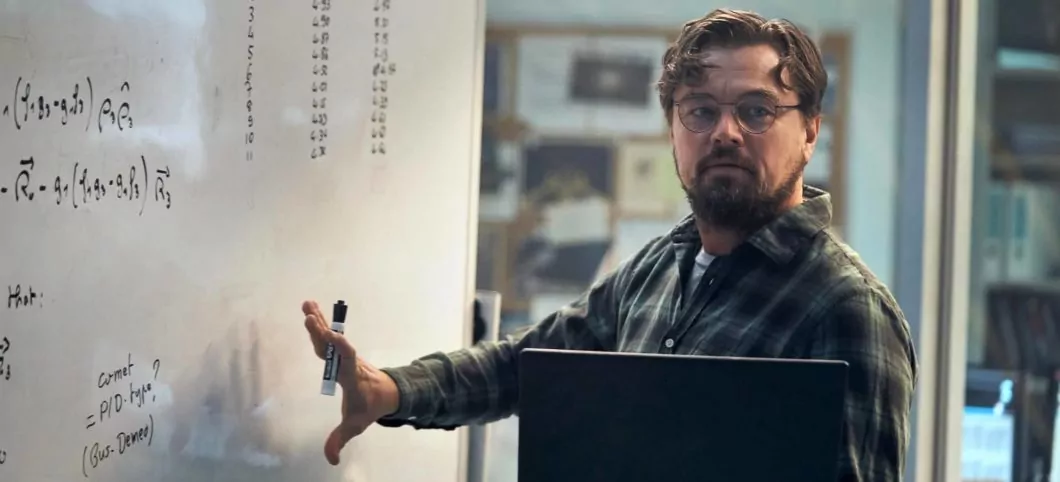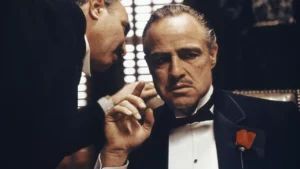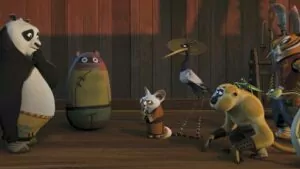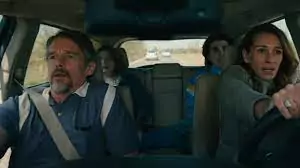
Don’t Look Up is a Comedy about a serious catastrophic event reaching the earth and on its verge to kill everyone, where the entire population takes it with a pinch of salt. Leonardo DiCaprio, who plays Dr. Randall Mindy goes in depth about the movie and working with Adam McKay, Jennifer Lawrence, Meryl Streep & Jonah Hill. Check it out below!
Q. Could you tell us what Don’t Look Up is all about?
Leonardo DiCaprio: If I were to describe Don’t Look Up in a nutshell, it would be an analogy of modern day culture and our inability to hear and listen to the scientific truth. I often in my career looked for a film that had an environmental undertone to it but much like the inundation of news on climate change, a lot of people don’t want to hear it and making a film about it is an even more difficult task to take on. And what Adam did that was so brilliant here was used the analogy of a giant comet heading towards Earth and how the human race would react to it from a political level, from a scientific level and what we would do about it. That was the brilliance of Adam McKay’s choice which I’ve never seen before. It harkens back to films like you know, Network or Dr. Strangelove. Hopefully films that have some sort of impact on our culture.
Q. Who is Randall and what’s his role in this big mockery of events?
Leonardo DiCaprio: Dr. Randall Mindy is an astronomer for Michigan State. Not necessarily a high-level astronomer but happens to be in the right or wrong place in time in this film where his student discovers you know, the sort of once-in-a-lifetime scenario where a comet is hurdling its way towards Earth and they do the calculations together quickly and basically notify the government that we’re pretty much all doomed unless we take immediate action. And it was a much different character than anything I have ever had the opportunity to play at. It really reminded me what it’s like for climate scientist, scientist like you know, Michael Mann for example when they’re put in the mainstream new circuit and told to talk about you know, the catastrophic events of the climate crisis. And here they are trying to be media-savvy and not politicize the issue but just try to articulate the facts the best they can.
Q. We see him stressing and loosing his breath in the trailer, clearly this possible adversity has left him in a state of panic…
Leonardo DiCaprio: I think he’s in complete shock and you know, it’s a very interesting scene because eventually they start to understand the magnitude of the problem but it doesn’t tie into their political agenda at the moment. And that’s something that I think from a scientific perspective, he doesn’t understand whatsoever. So they keep trying to rearticulate the probability of what’s going to happen to you know, humanity and they keep changing, you know, the percentage of probability of you know the apocalypse. You know, they’re negotiating it. And you know, to a scientist, this just doesn’t compute to him. So it’s bringing up anxiety and panic in him and I think they sort of leave that scene understanding that they’re involved in an administration that doesn’t fundamentally believe in you know, facts and truth and they’re only worried about the midterm elections and how they’re going to get, you know, voted in next. So they decided to go rouge and ultimately give this news to the world on their own which is against the law. So it kicks the movie off with a lot of tension. That’s for sure.
Q. What is about these haunting parodies of real catastrophes that attracts you?
Leonardo DiCaprio: Yes. I mean I have – like I said, I’m always a huge fan of a lot of these films that came from the 60s and 70s. Parallax View you know, Three Days of the Condor, the – certainly, Network and of course you know, Dr. Strangelove which you know talking about the cold war in a way that no one else was able to through dark comedy. And Adam who’s an incredible – incredibly outspoken individual on the climate crisis really wanted to do a film that harking back to those films that brought you know, an element of dark comedy to what seems to be a daunting and incredibly depressing issue. Like I said, it was – it just seemed like an opportunity that I couldn’t pass up and would be encapsulated at this moment in time and I could look back and say, well you know, with these opportunities that I have artistically as an actor, I was able to be a part of something that provoke conversation and made us really understand that you know, we had a point where we could turn things in a specific direction. Did we make those right decisions at that point or are we too caught up and distracted in this sort of modern world that we live in. But I just love that Adam took on this issue head on and it’s a very daring film to make. It’s in a lot of ways, you know, brings a mirror to our entire culture and how we deal with bad news. And whether you know, us a species can evolve to truly focus on what is ultimately the most important issue that’s ever faced humanity in the history of civilization. So it had a lot of stakes to it and I just knew I needed to be a part of this film. I knew it brought up incredibly interesting.
Q. How is the dynamic between you and Adam McKay and what’s it like working with him?
Leonardo DiCaprio: I’ve been a fan of his work, gosh, ever since you know Anchorman, all the way to Stepbrothers. Then you know, right up to Vice and seeing this sort of transition in how he’s taken on these incredibly complex political issues but retained this really dark shrewd intelligent comedic undertone to a lot of them and this was – this is in a lot of ways the sort of full fruition of what he’s been able to mend together thematically and tonally in movies. It’s taking on like I said the biggest crisis that we’ve ever had to face with you know, a sarcastic and really genuinely funny look at us a species.
Q. How much of a relatability factor do you think a film like Don’t look Up carries?
Leonardo DiCaprio: You know, I’ve spoken to many climate scientists but this was taken from a viewpoint of an astronomer that was – it was amazing to see the parallels in their thinking. I mean she might as well have been a climate scientist that way she looked at how, you know, we collectively ignore science and that she was an environmentalist in her own right but she helped me incredibly in playing Dr. Randall Mindy just to be able to articulate this science and basically almost gave me a Carl Sagan like download on what astronomy is, what it means to be an astronomer, what you look for and the importance of what that means for my character. So we spoke a lot and like I said, especially in COVID, you know, a lot of my rehearsal and trying to articulate the science to her was done you know, over the phone and she was probably one of the most helpful element to my character that I could’ve imagine. Usually as an actor able to interact with a lot of different people but due to the confinement of COVID, she was the main person that I spoke to.
Q. It’s almost poetry how you all essentially made this movie during such a dire turn of events, how did that impact the atmosphere on set?
Leonardo DiCaprio: It’s a very unique point in time where we got to do this movie, in the height of COVID with the crisis still going on. A film that was you know, originated and trying to articulate the confusion of the climate crisis then became about the COVID crisis and it attracted a group of unbelievable actors that I got to work alongside everyone from you know, Jen to Meryl to Jonah Hill. I mean the list goes on and on. Timothée Chalamet, Cate Blanchett of course. So all of us sort of came together with an incredible excitement and real energy about wanting to tell the story and Adam gave us this very interesting opportunity to really try anything. And so, right of the bat, you know, Jen and I really developed our character – characters on camera. It was done through a lot of different improv but you know, it started off as the sort of snarky relationship but then I think it kind of evolved as we were filming and due to the tension of what these scientists are trying to articulate as this very sort of paternal caring relationship where they really you know – ultimately, you’re looking out for one another. And getting to see Meryl and Jonah in the White House ignore this issue and divert it and talk about incredibly shallow things while we’re – we’re trying to explain to them that the world is ending was genius. So there was so many different actors that just came in and were given free rein to really delve into their characters and it was a set and an atmosphere where we kind of felt like anything goes.
Q. This is your first time working with Jennifer Lawrence, how do you feel about her as an actor and what was your experience collaborating with her?
Leonardo DiCaprio: I think – you know I’d always wanted to work with Jen as an actress. She’s one of the most talented actors working today and to have this sort of partnership with her, you know, I’d known her beforehand but playing both of these characters and being able to joke around constantly with her about the uncomfort of both of our characters, that was the main highlight to me. And her ability to improvise and be so in the moment at all times was amazing to witness. I just – I had a great time working with her and I had a great time watching her develop her character and develop the relationship between of these people that are just trying their best.
Q. You have worked with both Meryl Streep and Jonah Hill before. What was the reunion on set like?
Leonardo DiCaprio: So yeah. It was just amazing to be reunited with both of them. Like I said Meryl, I haven’t worked with since I was 18 years old and she had this incredible monologue and just to witness her sort of mastery as an actor was a real gift and then you know, putting her in a room with Jonah Hill who basically would go off the cough and go on different directions as an improvisational actor was sort of inspiring. And they really nailed their characters and they really portrayed them as completely unhinged, absolutely undependable leaders which was a huge motivation for Jen and I for the rest of the film.
Q. Finally, what was it like being directed during Covid and did that affect the way you usually work with directors?
Leonardo DiCaprio: Adam McKay is a director that I’d been wanting to work with for a long time and his ability to combine comedy with incredibly pertinent issues, especially with this film having the – having the undertone of the climate crisis and of course what happened with COVID, it was a – it was a unique opportunity to work with somebody that really allowed all of us as actors to really collaborate and improvise. And like I said, Adam is somebody that values everyone’s opinion and allows you as an actor to take a scene in any direction that you see fit. And because of COVID and in a lot of ways, we got to only you know, interact with him from a microphone that would sort of emanate in the different sequences that we’re working in and it was just reassuring that we had his voice of comedic genius and intellect as we were you know, taking these scenes in all kinds of different directions.
The Movie Culture Synopsis
Don’t Look Up is available to stream on Netflix.



